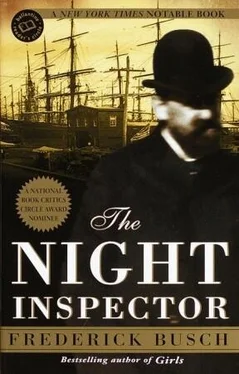“The captain pitched over dead,” he said, “frozen on the spot. He fell out of his shoes, in fact, and they remained adhered to the deck by inches of ice that now lay over everything. This was — did I tell you? — the winter of 1832, famous for its killing chill. The frail were culled, and only the hearty survived the year, especially along the English coast.
“That left a first mate who was too drunk, whether with fear or gin I cannot say, and a second mate who was barely old enough to tell himself what to do, much less a crew of a dozen tars who had long before that, I daresay, considered catching and eating him.”
“They were cannibals?” I remembered saying, gullible as a lamb in an abattoir.
“Shipmate, there’s more than one way to devour a boy on a boat,” he told me. “But to the inclemencies, then, shall we? Here they are: worse than becalmed because a ship with no wind can send a cutter out to tow her an inch at a time if needs must. And there’s always the hope of a sudden gust of wind. But this was the dead of winter, mind. And the ship as fixed in the ice as a glass eye in a stuffed and mounted Muscovy duck. And the temperature falling, and night coming on, and the captain dead, the first mate incapacitated and soon enough to freeze to death.
“ ‘What shall we do, sir?’ calls the cabin boy to the second mate. The men fall about grunting — it would have been laughter in a fairer clime — at the sight of the little fellow thus questioning the fellow not much larger or older.
“ ‘We’ll make a fire!’ pipes the second mate, intent on doing his duty, and on seeing the crew through the fray.
“ ‘What shall we burn, then, lad,’ groans an able-bodied, ‘fish in blocks of ice?’
“ ‘Charts, the log, and every book on board,’ cries the second mate.
“A fellow known as Button, Sterling Button, called by his shipmates either Silver or Bone, scholarly man with gold-rimmed spectacles tied round the back of his head to keep them on when he’s up in the ropes, says, in his deep voice that matches his broad, manly shape, ‘I’d rather perish, sir.’
“ ‘But you will,’ the second mate is wise enough to note.
“ ‘Then I will, but I’ll not burn my books.’
“ ‘What’s in ’em, then?’ asks one of the rugged net haulers, shivering in his boots and oilskins.
“ ‘Poetry,’ Button tells them. ‘Sweet music, hard truth, and wisdom. And a bit of sorrow, like spice in a Polynesian stew. Madness, even, though of the sane variety. And not for burning.’
“With that, he bolts, for he knows they’re soon to act. He hies himself to his hammock and his seaman’s trunk, a lovely structure of polished maple from his native New Hampshire and leather from a deer he shot when home. He opens the lid for an instant, looks in at the titles and the authors’ names, and, bidding farewell to the likes of Ben Jonson and William Shakespeare and Laurence Sterne, he shuts the trunk and locks it, and he swallows the small metal key. ‘They can cut it out of me when they’ve done their worst,’ Button says. He opens his clasp knife and sits, awaiting them, perched atop his seaman’s trunk in the middle of a frozen waste like an Anchorite in the sweltering sands of the Holy Land.”
He had leaned, again, to refill our glasses, spilling a little after having drunk much.
“And there he sat.”
“But what happened? I must beg you: finish,” I said.
“No, shipmate. In the case of the tale of Button and his books, what happened matters less than Button’s decision.”
“To die for his books.”
“Exactly. Perfectly spoken. Die for his books. That , shipmate, is a reader for whom a man might decide to write something and see it through the printers and reviewers. Die for his books.”
“And that,” I remember saying, disappointed and bemused, “is all?”
“It is everything,” he said.
“You startle me with your unorthodoxy,” I ventured to say, “but you do so surely tell a tale. I dare not complain.”
“So they once said,” he told me, and turned his attention to the blue, oily gin.
His son, I thought, stepping back from the wheels of a yellow-and-white ice wagon from which trailed some of the sawdust used to insulate the great, cloudy blocks, had none of the highly flavored language, none of the easy command of one’s attention, nor any of the certainty — for all the uncertainty of M’s latter days — that made him a present public official and, once, an author to be reckoned with. His son was, in fact, a bully and a lout. He would enjoy the murder of Indians, I wagered.
I knew men, I reminded myself, who had engaged in a war’s worth of murder.
It was battle, I demurred. I was a soldier.
But the bully boy will also be a soldier, I told myself.
I could not have been more mistaken.
Outside the Five Points House of Industry that same night, I paused beside its smeared, unlighted window and its rugged wooden door. This was a refuge, I knew, for Chinese boys who wished to learn a trade other than their father’s. Women, of course, did not attend, nor were they taught how to dress like Americans and speak the language of the United States. They were drowned at birth in China, I had heard men say at the coffeehouse beneath the Equitable Building. Surely, reading of gold miners in California and Oregon — it was where Chun Ho and her people had come from: “Oh-gin.” “Where?” “Oh-gin!” “Oregon?” “Sure”—I had seen stories of the binding of women’s feet at birth, of the uselessness, to their family, of girls, who would finally be of service as breeders for the groom’s family. Chinese women rarely appeared on the streets, and I saw very few, and all of them were bulky in their silk pajamas and oval shoes, and none seemed to walk with the abrupt energy of Chun Ho or, for that matter, to sit with the profound contemplation I sensed in her. I had seen her lift filled laundry baskets, two of them, each balanced on the end of a stick, that were almost as tall as she. Somehow her mother had felt obliged to serve Chun Ho’s wish for independence. Somehow Chun Ho had felt obliged to serve her own. I knew that she had a daughter and a son, and I knew that she would feel obliged to raise the daughter as an American person — a girl strong enough to live alone.
The Points, of course, were echoing as of wild creatures nailed inside barrels — calls, laughter, sexual cries, every variety of uneasiness and dismay, and the working sounds of the lower levels of industry composed of loom shuttles slapping, stable doors slamming, donkey carts rattling, honey wagons gurgling with the refuse of a tenement’s month. But what I thought of, as I walked, immersed in the life I had chosen as if it were the sea and I a kind of misshapen fish, was obligation: Jessie’s to her people, and Chun Ho to hers, and mine to gelt. To be sure, I felt loyalties of several sorts, emotional and otherwise; I was no monster, though I might be said to resemble one now and to have resembled one then. But I did not belong to a species or a people or a family or, say, fang , the group that gave general assistance, or, say, a shantan , which, as she explained it, was concerned with keeping a Chinese cemetery, and eventually transporting their dead back to China, as was, it seemed, their way. There was no group, from traders’ organization to cemetery society, to which I cared to belong. So no one would bury me; I was for potter’s field unless I gave instructions and left money in someplace safe for someone who cared to recover it and pay to cover me up.
Yet Sergeant Grafton had felt a loyalty to me. He had not wanted to, but I remembered, finally, his coming up the tree so swiftly, with such ferocity, and the gentleness of his voice: Here we come. We’re coming. Here we come . The remembering him, and my thoughts of gentle Sam: Were those not loyalties?
Читать дальше












